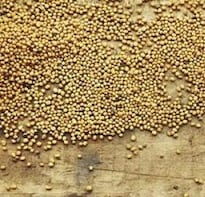Mustard, and mustard seed, is an indispensable ingredient in any cook's larder. Whole, mercury-black mustard seeds, either dry roasted, or "tempered" in a hot oil with fresh curry leaves, show off their nutty character in southern Indian cooking. Once ground, mustard seed releases its warmth, earthiness and pungency. Smooth mustard brings a kick to otherwise mild and cuddly dishes, such as croque monsieur, quiche and cauliflower cheese. The emulsifying properties of smooth mustard make it handy in vinaigrette, or to help bring together and thicken a sauce. It's a taste thing whether you go for the yellow, English, sinus-clearing type, or the mellower European sort. Wholegrain mustards can be aggressively vinegary, so be sure you want that acid note before you add it too enthusiastically.
Why is mustard good for me?
The Greeks and Romans were on to something when they used mustard seeds for medicinal purposes. The mustard plant, like broccoli, radish and cabbage, belongs to the brassica family, a group of vegetables that contain health-promoting glucosinolates. Enzymes in the seeds then break these down into isothiocyanates. These compounds give mustard its eye-watering pungency, and many studies now suggest that they also seem to inhibit the growth of cancer cells, most notably in the gastrointestinal tract and colon. Mustard seeds are an excellent source of selenium, a trace element that is also thought to have an anti-cancer effect.UK soils are generally low in selenium so eating mustard, and mustard seeds, can help boost your selenium level.Where to buy and what to pay
Indie delis are good bets for an interesting range of mustards, including locally made ones. Bigger jars are nearly always a much better deal, and mustard keeps quite well in the fridge. Mustards in tubes and squeezable bottles cost more than those in glass jars.Joanna Blythman is the author of What To Eat (Fourth Estate, £9.99). To order a copy for £7.99 with free UK p&p, go to theguardian.com/bookshopAdvertisement
Grilled mustard haddock
I use this mustard marinade with rabbit, chicken or pork and tend to serve it with braised savoy cabbage with bacon and some mash. Or in warmer days, a bitter leaf and orange salad.Serves 42 shallots, peeled and finely sliced
2 garlic cloves, peeled and crushed
5 tbsp Dijon mustard
A few sprigs of thyme, thick stalks stripped
1 tbsp cider vinegar
120ml olive oil
1 tsp brown mustard seeds
4 pieces of haddock or other white fish, skinned
Salt and black pepper1 Put the shallots, garlic, mustard, thyme and vinegar in the food processor and whizz to a smooth paste. Add all but a tbsp of the olive oil, salt and pepper, and whizz for a bit longer. Pour into a tray and thoroughly coat the fish. Sprinkle with the mustard seeds. Cover and leave overnight.
Advertisement
Advertisement
For the latest food news, health tips and recipes, like us on Facebook or follow us on Twitter and YouTube.
Advertisement
